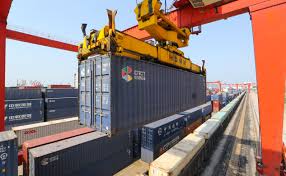A government report was released by China that promotes the 10-year-old Belt and Road Initiative while downplaying accusations that it has burdened developing nations with excessive debt. China is promoting the initiative as an alternate model for economic development.
Construction of ports, power plants, railways, and other projects has all been funded by the program supported by Chinese President Xi Jinping.
Li Kexin, the director for international economics affairs at the Foreign Ministry, told reporters that the Belt and Road has “fully proved that it does not engage in a closed and narrow circle, transcends the old mindset of geopolitical games, and creates a new paradigm of international cooperation” over the past ten years.
The Belt and Road Initiative, or BRI has supported projects since its inception that were primarily carried out by Chinese construction firms and financed by loans from Chinese development banks.
Its stated objective is to increase investment and trade by enhancing China’s transportation connections to the rest of the globe. Analysts acknowledge that the program helped poor countries get the funding they needed, but they claim that this came at a price.
According to an analysis published on Monday by the Global Development Policy Centre at Boston University, the BRI has provided more than $330 billion in loans to governments of developing countries through 2021 lending more in certain years than the World Bank.
Director of the Centre Kevin Gallagher remarked, “On some level, China has added a World Bank to the poor world, and that is no small feat and extremely welcomed by developing countries.
The same report did, however, observe that many receivers of Chinese loans are currently having trouble paying off their overall debt. Additionally, roughly 245 million tons of carbon dioxide are released annually by power plants with Chinese funding, which increases greenhouse gas emissions.
The effort, according to Gallagher, has shifted to a new emphasis known as “small and beautiful,” which favors more modest developments and renewable energy.
China’s development financing has decreased recently, in part because of lessons learned from other nations’ debt crises and in addition to the fact that China has less money to lend as its own economy contracts.
Senior planner Cong Liang declared during the BRI report’s release that China would uphold “the principle of sustainable debt” and cooperate with other debtor nations to create “a sustainable and risk-controllable investment and financing system.”
China’s aspirations to achieve international recognition and counter American criticism of Communist Party control and Beijing’s human rights record are reflected in the Belt and Road Initiative.
China’s leaders charge that the United States is attempting to impose its values on everyone, including China. They claim that their system gives a unique perspective that embraces other nations for what they are.
During a trip to China this week, a group of senators from the United States reportedly made sure to stress to Chinese leaders their pledge to “remain steadfast in our commitment to promoting stability in the region, freedom, and democratic principles and vigorously defend our values.”
Beijing claims that the current course of globalization has only expanded the divide between rich and poor countries, but the BRI report claims that the program transcends differences in ideology and social systems and offers an alternative.
The research stated that “it is no longer acceptable that only a small number of countries dominate world economic development, control economic rules, and reap the benefits of development.”
China is anticipated to convene a symposium next week to highlight the BRI initiative.

















